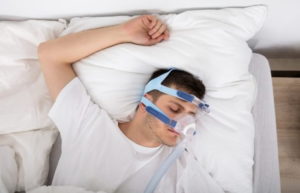While snoring may seem harmless, it can be a sign of a more serious condition that affects your physical and mental health. It’s easy to know that you have this problem when you have a sleeping partner to tell you about this habit. But what if you sleep alone? How would you know if you snore?
The anatomy and physiology of snoring
Snoring is a harsh and hoarse sound that comes out when the palate tissues (roof of the mouth) that comprise the airways relax too much and collapse, causing a partial or complete blockage. The narrowing or blocking of the airway causes the sound of breathing to vibrate within the airways of the nose and throat. Basically, snoring is simply a sound resulting from turbulent airflow that causes the tissues of the palate to vibrate during sleep.
Snoring can be caused by a multitude of things, such as the stage of sleep, sleeping position, the use of alcohol or medications, or a genetic problem. In most cases, however, OSA is a sign of a serious underlying condition that requires immediate attention, management, and treatment.
Most people have gotten used to snoring so much that they just take it for granted. This makes chronic snoring a common, yet largely undiagnosed problem in the world.
How to know if you snore
Ask your partner
Snorers are oblivious to their snoring. Thus, the best way to know if you snore in your sleep is to ask the person sleeping next to you. While you may feel awkward to outright ask “did I snore last night?” It’s the best thing to do.
Imagine if it’s the other way around. If your bed partner snores loudly, you get awakened from your sleep feeling annoyed and frustrated. Not to mention you will feel sluggish and tired the next day because of interrupted sleep. Ignoring or keeping somebody’s sleep apnea a secret is bad for both you and your bed partner.
Look for the symptoms
Morning headaches, sore throat, daytime sleepiness, mood swings, fatigue, frequent urination, lack of concentration, and even depression – these are just some of the tell-tale signs you are not getting enough sleep due to disrupted sleep caused by your chronic snoring.
Note that you don’t need to experience all of these symptoms before you seek help. If you feel you are suffering from sleep apnea by experiencing a couple of these symptoms, then you should see your doctor.
Make use of tech
If you live alone, or if you don’t feel comfortable asking your bed partner about your snoring, and you are still unsure of the symptoms, then you can download a snore-recorder app. There are a bunch of them in the apps store for both iPhone and Android devices, and you can’t go wrong with most of them.
Use the app before going to bed to record any snoring. You will get a detailed analysis of your sleep the morning after.
Write sleeping notes
Have a journal and pen ready by your bedside table and track your sleeping activity. Some of the metrics you need to look out for include:
- Time you went to bed
- Time you wake up
- Number of times you woke up during the night
Moreover, take note of how you feel in the morning. Be very specific as much as possible. Also, write down the days when you had alcohol or cigarettes. This can help your doctor understand your condition and situation better, should you visit for a checkup soon.
Consult a doctor
If your bed partner has not persuaded you, or you cannot get an accurate answer when you ask if you snore (some people may be immune to noise when they’re asleep), then your next best option is to visit a sleep specialist.
The best specialist to look for is a Board Certified Otolaryngologist (ENT Doctor). The sleep specialist will carefully examine all your symptoms. He/she may also ask your bed partner about your snoring and try to determine if your snoring is a symptom of a more serious medical condition.
You will also be asked to complete a sleep study. This will provide your doctor with the in-depth data needed to determine your condition and how serious your snoring may be and will also help your doctor identify the right medical attention, and personalize a management course of treatment plan to address the snoring. There are multiple non-invasive, minimally invasive, and cutting-edge treatments available today to address this sleep disorder, even permanently.
Possible treatment options
While there is a multitude of sleep apnea treatment options out there, they can be categorized into four types.
Oral appliances
These areused for mild to moderate OSA. Mandibular Advancement Splints (MAS) are simple, non-invasive, and removable devices similar to bite guards or mouthguards used to prevent teeth grinding and jaw clenching (bruxism).
Patients who can be treated with these will have to wear the appliance each time they go to bed. It fits over the teeth similar to an orthodontic retainer and holds and supports the jaw in a forward position to keep the airways open. It also holds the tongue in place, keeping it from falling too far back to prevent blocking in the airways.
Positive Airway Pressure (PAP) machines
There are three PAP machines used today: CPAP, APAP, and BiPAP.
Continuous positive airway pressure (CPAP), the most prescribed treatment for OSA, works by delivering continuous and steady air pressure for both inhalation and exhalation.
Auto-adjustable positive airway pressure (APAP) is a great option for its ability to provide different pressure rates depending on the need of the patient, which is largely based on their breathing pattern.
Bi-level positive airway pressure (BiPAP) works by providing different pressure rates for inhalation and exhalation. While largely similar to APAP and CPAP, BiPAP offers higher peak pressure flow, best for patients who need moderate to high-pressure ranges for their breathing during their sleep.
Lifestyle changes and good sleeping habits
This is probably the most important course of treatment for anyone suffering from sleep apnea.
Since most people who snore are overweight, losing weight and body fat can definitely help, since it means less fat tissue surrounding the neck. Also, many people find relief from snoring by sleeping on their sides.
Surgery
Surgery is usually the last resort for chronic snoring. Surgical procedures involve the removal of some tissues in the back of the throat to make way for better airflow.
If you think snoring is affecting your life, then it is best to talk to your doctor and have your condition properly diagnosed and addressed as soon as possible. Get that good night’s sleep you need. Talk to your doctor today!


























